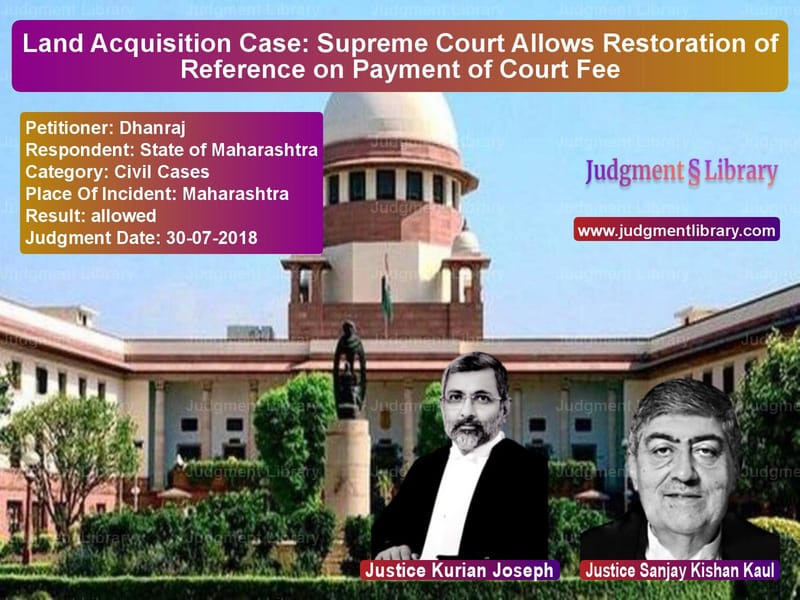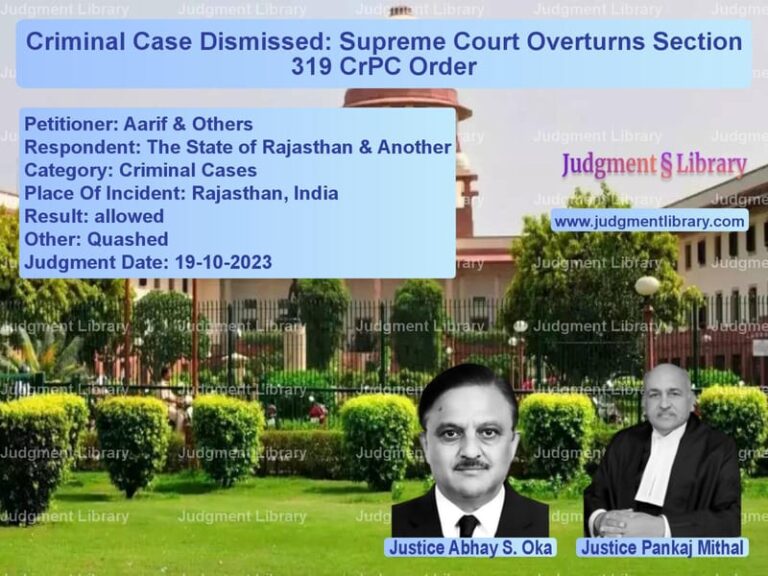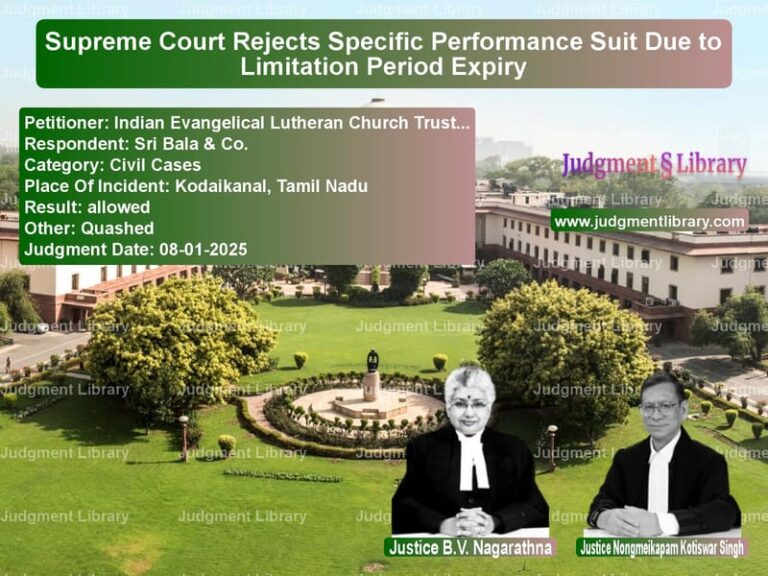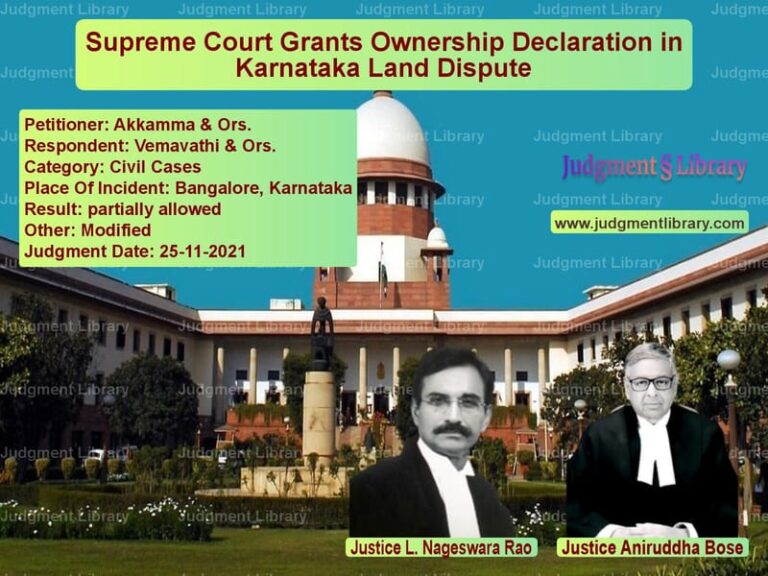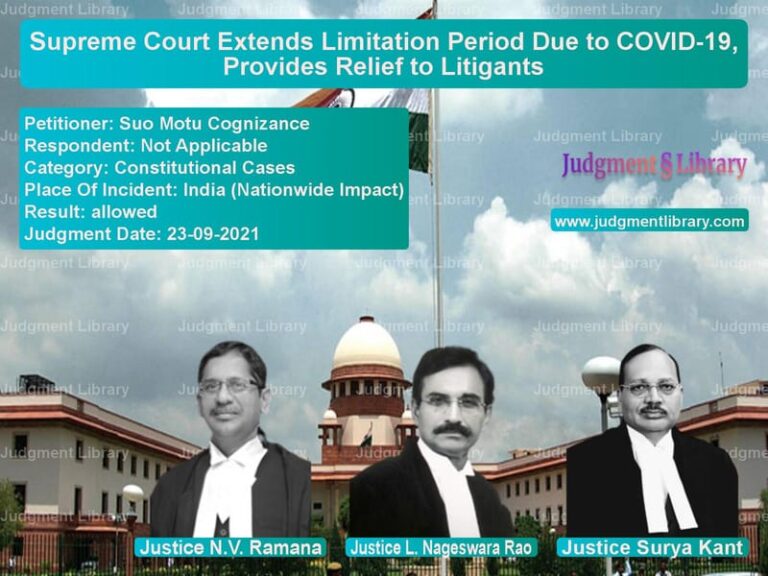Land Acquisition Case: Supreme Court Allows Restoration of Reference on Payment of Court Fee
The case of Dhanraj vs. State of Maharashtra concerns the dismissal of a reference under Section 18 of the Land Acquisition Act, 1894, due to non-payment of the requisite court fee. The Supreme Court had to determine whether the appellant’s reference application could be restored upon payment of the court fee, even after a long delay.
Background of the Case
The appellant, Dhanraj, had filed a reference under Section 18 of the Land Acquisition Act, seeking enhanced compensation for his acquired land. However, the Reference Court dismissed his application due to the non-payment of the required court fee. His subsequent attempts to have the application restored were unsuccessful. The High Court also refused to interfere with the decision of the Reference Court, leading him to file an appeal before the Supreme Court.
Legal Issues Raised
1. Can a Reference Application Dismissed for Non-Payment of Court Fee Be Restored?
The primary issue was whether the appellant’s application for enhancement of compensation could be revived after being dismissed due to the non-payment of the prescribed court fee.
2. Waiver of Statutory Benefits for Delay Period
Should the appellant be allowed to claim statutory benefits for the period between the dismissal of the reference and its restoration?
3. Precedents for Granting Relief
Did the Court follow any precedents where similar applications were entertained despite delays?
Arguments by the Parties
Arguments by the Appellant (Dhanraj)
- The dismissal of the reference application was purely technical, as he was willing to pay the court fee but had been unable to do so earlier.
- Similar matters had been entertained by the Reference Court on the condition that statutory benefits for the delay period were waived.
- His claim for enhanced compensation was valid and should not be dismissed due to a procedural lapse.
Arguments by the Respondent (State of Maharashtra)
- The appellant failed to comply with procedural requirements by not paying the requisite court fee, leading to the dismissal of his reference application.
- The delay in seeking restoration was excessive, and the High Court was justified in refusing to interfere.
- Allowing such applications would set a precedent that could undermine procedural discipline in land acquisition cases.
Supreme Court’s Observations
1. Reference Application Can Be Restored on Payment of Court Fee
The Supreme Court ruled that the appellant’s reference application should be restored, provided he paid the requisite court fee within one month. The Court stated:
“Subject to the appellant paying the required court fee, within one month from today, the application for reference will stand restored.”
2. No Statutory Benefits for the Delay Period
The Court clarified that if the Reference Court granted any enhancement in compensation, the appellant would not be entitled to statutory benefits for the entire period between the dismissal of the reference (07.02.2001) and the present order (30.07.2018). The judgment stated:
“However, we make it clear that in the event of the Reference Court granting any enhancement, the appellant shall not be entitled to any statutory benefits for the entire period i.e., from the date of dismissal (07.02.2001) of the reference to this date (30.07.2018).”
3. Consistency with Past Precedents
The Court noted that in similar cases, the Reference Court had entertained applications subject to the waiver of statutory benefits for the delay period. This ruling aligned with those precedents.
Final Judgment
The Supreme Court disposed of the appeals as follows:
- The appellant must pay the required court fee within one month.
- The reference application would then be restored.
- If the Reference Court granted any enhancement, no statutory benefits would be given for the period of delay.
- Pending applications, if any, were disposed of.
Implications of the Judgment
This ruling has significant implications for land acquisition disputes:
- Provides Relief for Procedural Lapses: Ensures that genuine claimants are not deprived of their rights due to procedural issues.
- Maintains Procedural Discipline: Reinforces that claimants must comply with procedural requirements but allows for flexibility in cases of genuine hardship.
- Balances Equity and Timeliness: Prevents undue enrichment by disallowing statutory benefits for delay periods while allowing the reference application to proceed.
- Clarifies Precedent for Future Cases: Sets a guideline for courts to follow in similar land acquisition cases.
Conclusion
The case of Dhanraj vs. State of Maharashtra highlights the Supreme Court’s balanced approach in handling procedural lapses in land acquisition cases. While ensuring that procedural requirements are met, the Court has also provided relief to the appellant by allowing the restoration of his reference application. This ruling affirms the principle that procedural shortcomings should not completely obstruct access to justice, provided corrective measures are taken.
Petitioner Name: Dhanraj.Respondent Name: State of Maharashtra.Judgment By: Justice Kurian Joseph, Justice Sanjay Kishan Kaul.Place Of Incident: Maharashtra.Judgment Date: 30-07-2018.
Don’t miss out on the full details! Download the complete judgment in PDF format below and gain valuable insights instantly!
Download Judgment: Dhanraj vs State of Maharashtra Supreme Court of India Judgment Dated 30-07-2018.pdf
Direct Downlaod Judgment: Direct downlaod this Judgment
See all petitions in Property Disputes
See all petitions in Damages and Compensation
See all petitions in Public Interest Litigation
See all petitions in Judgment by Kurian Joseph
See all petitions in Judgment by Sanjay Kishan Kaul
See all petitions in allowed
See all petitions in supreme court of India judgments July 2018
See all petitions in 2018 judgments
See all posts in Civil Cases Category
See all allowed petitions in Civil Cases Category
See all Dismissed petitions in Civil Cases Category
See all partially allowed petitions in Civil Cases Category

